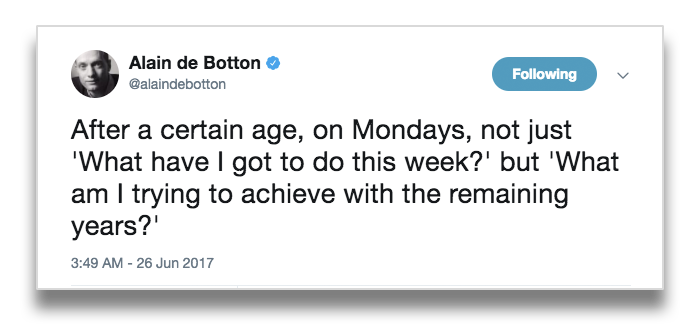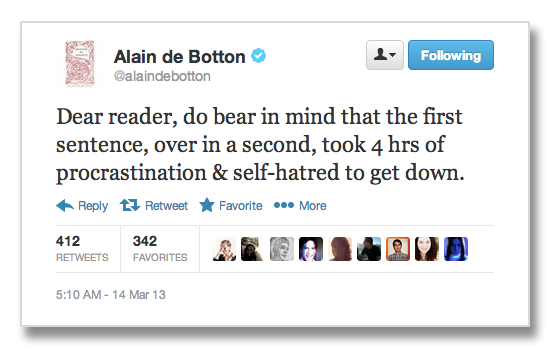
Tweet of the Day

Official website of the author


Sysomos, a maker of social media analysis tools, looked at 1.2 billion tweets over a two-month period to analyze what happens after we publish our tweets to Twitter. A few highlights:
Tumblr is having a moment. A big profile in the Times, a lot of buzz in the geekier precincts of the interwebs, phenomenal growth (the service adds 25,000 new accounts daily). For the uninitiated, Tumblr is a platform for “short-form blogging,” meaning that a “tumblelog” is a blog with very short posts, usually a single, found object — a quote, image, song, or video — offered with little or no comment. “If blogs are journals, tumblelogs are scrapbooks,” the Tumblr web site used to explain helpfully. Essentially it is a place to share the little interesting things you find as you wander around the internet. It is not a place for long, navel-gazing essays. Here are a few good tumblelogs to give you a sense of it: Fuck Yeah, Literary Quotes, ck/ck, and Laughing Squid.
Lately I’ve been fiddling around with Tumblr and I am smitten. While I was cranking through the final rewrite of my latest novel the last few weeks, Tumblr became my main diversion. (I have so many.)
I can see the enormous potential of Tumblr. It has a social-networking aspect: you can follow people as you do on Facebook or Twitter, and view their posts in a Twitter-like stream. But it is more interesting than either of these, since Facebook does not have interesting content (my feed is mostly filled with snapshots of friends’ kids) and Twitter is straitjacketed by its 140-character format. Tumblr is also beautifully designed and dead simple to use.
The primary drawback of Tumblr, it seems to me, is that there just aren’t enough users yet to make it really compelling. As a link farm, Tumblr’s format kicks Twitter’s ass. The links I find on Twitter are cloaked behind those opaque fortune-cookie messages, and of course they require a click-through to see what the content really is. Very inefficient. My Tumblr feed is a lot easier to read. But Twitter has so many more interesting users than Tumblr that it is still my first stop when I go snuffling around the web for interesting reading material. (My second stop: Google Reader, still.)
Inevitably, I have started my own tumblelog. I will still post my “real” blog entries here at my grown-up blog. But for the little things I find laying around the web — like, say, a video of a naked man putting himself through a hay baler — Tumblr is the scrapbook where I’ll paste them. Come check it out. We’ll see how the new tumblelog develops over the next few months.
(Note: Must … resist … reference … to Culture Club. D’oh!)
Buzz Bissinger — who has a Pulitzer Prize and a smash book, Friday Night Lights, to his credit — was in a low mood when he sat down to work Monday morning. At 9:29, he tweeted:
My last book with LeBron was shit. I know that. All writers only have a finite amount in the tank. Every day — the fear you have run dry.
This was followed by a series of tweets, each separated by two or three minutes.
I wrote Friday Night Lights when I was 33. I am now 55. Haunts me every day. Best thing that ever happened. Worse thing that ever happened. [9:31]
When people call me over-the-hill I react with profane defensiveness. But maybe it is true. It crawls into my head every minute, every day. [9:33]
I have a beautiful book on my hands about my son. I can barely write a sentence w/o crippling self-doubt. i get encouragement — turn it off. [9:35]
I am angry. I do hate bullshit. But maybe I am the biggest bullshitter of all, passing judgment on those who still do. Am I caricature? [9:38]
It isn’t self-pity writers feel. It is fear that what you did was accidental, luck, no more words left. Only to escape it seems was Updike. [9:43]
At 9:51, pulling out of it, he tweeted,
Writing is a matter of confidence, like any creative act. You gain it, you lose it, you gain it, you lose it. No better high. No worse low.
And five minutes later, after he’d apparently received some encouragement from other Twitterers, he concluded,
Enough. Your support means a tremendous amount to me. And as some have said, pull up your socks and get back to work.
I haven’t accomplished anything like what Bissinger has, but I have felt all these doubts, every single one. Most writers do. Probably most creative artists of all kinds do. In a weird way, it is reassuring to hear someone so accomplished cop to it.
A strange benefit of the real-time web: the ease of broadcasting confessions like these in the false intimacy of a lonely office allows writers to peek over each other’s shoulders.
The only mood in which to start writing is self-disgust. Writing becomes an act of atonement for procrastination — and “self-waste.”
— Alain de Botton, master Twitterer
Selections from the Twitter feed of Alain de Botton, a master of the tweet.
The attraction of the melancholic: sadness has created the room we’re going to take up in their lives.
We can only envy people towards whom we feel equal: it would not occur to anyone to envy the queen for her house. She is too odd to envy.
Definition of good parenting: that the child grow up with no wish to become a writer.
The book will be killed not directly by new technology but by the monkey mind it breeds. The issue is concentration, not royalties.
His tweets about the writing life are dead-on:
Good work only happens in the last 10 minutes of the day, when the fear of not accomplishing anything at last exceeds the fear of writing.
Writerly self-disgust: How rare to finish a day and think: I have worked hard and dutifully to the best of my ability. 1 day out of 20?
Stories of macho writers taking to drink has a tendency to cloud why they did so: because they were scared witless … of writing.
Writers are sucking in (unconsciously) the modern obsession with productivity — and forgetting about effectiveness.
Follow this man’s feed! (Hat tip: The Second Pass)